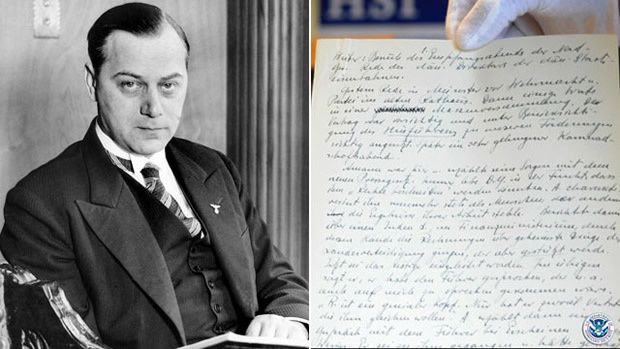 published 13/06/2013 at 08:23 by Alyssa Newcomb
published 13/06/2013 at 08:23 by Alyssa Newcomb
Missing Nazi Diary Recovered by Federal Authorities
Hundreds of pages of the long-lost diary kept by one of Adolf Hitler's advisors were recovered by federal officials, who said today they hope the discovery will be an "important record" of crimes perpetrated during the Holocaust.
The diary, which was penned by Alfred Rosenberg, is roughly 400 pages of loose-leaf paper and spans from 1936 to 1944, according to a statement from the United States Holocaust Memorial Museum.
The museum said it worked with a private investigator, the FBI and the Department of Justice to locate the missing diary earlier this year at a private company in New York. It was seized by federal agents who worked with a scholar to authenticate the diary before its recovery was announced today.
"Rosenberg was privy to much of the planning for the Nazi racial state, mass murder of the Jewish people, planning and conduct of World War II and the occupation of Soviet territory," the U.S. Department of Homeland Security said in a statement today. "As such, his diary entries could provide historians with a potential wealth of previously unknown information regarding the history of this period."
As a close Hitler aide and Nazi propagandist, Rosenberg led the Nazi's foreign affairs department and was appointed Reich minister for the occupied Eastern Territories in July 1941.
His diary, along with a trove of other unclassified documents, fell into the hands of Robert Kempner, a Jewish man who immigrated to the United States in 1939 and who later served as assistant U.S. chief counsel during the International Military Tribunal at Nuremberg.

Federal officials and representatives from the U.S. Holocaust Memorial Museum in Washington announced the release of the Alfred Rosenberg diary.
Kempner was allowed by the Office of the Chief of Counsel of War Crimes to keep the documents for the purpose of writing, lectures and studying, according to the United States Holocaust Memorial
Museum.
He died in 1993 and, four years later, Kempner's heirs told the museum they planned to donate the documents. The Rosenberg Diary, however, had remained missing from the museum's collection until it was tracked down by federal agents.
The diary was taken to the Department of Homeland Security office in Wilmington, Del., according to the museum, where a scholar verified the authenticity of the loose-leaf pages, which are said to be in good condition.
Henry Mayer, the museum's senior advisor on archives, said that while the museum's team had yet to fully examine the contents of the diary, "it does give details that one would never know about the politics within the top leadership of the Nazi Party and the state."
Rosenberg's 1930 book "The Myth of the Twentieth Century," philosophized on National Socialism and Aryan culture.
After the war, he was found guilty of crimes against humanity at the Nuremberg trials and was hanged in 1946.
He died in 1993 and, four years later, Kempner's heirs told the museum they planned to donate the documents. The Rosenberg Diary, however, had remained missing from the museum's collection until it was tracked down by federal agents.
The diary was taken to the Department of Homeland Security office in Wilmington, Del., according to the museum, where a scholar verified the authenticity of the loose-leaf pages, which are said to be in good condition.
Henry Mayer, the museum's senior advisor on archives, said that while the museum's team had yet to fully examine the contents of the diary, "it does give details that one would never know about the politics within the top leadership of the Nazi Party and the state."
Rosenberg's 1930 book "The Myth of the Twentieth Century," philosophized on National Socialism and Aryan culture.
After the war, he was found guilty of crimes against humanity at the Nuremberg trials and was hanged in 1946.